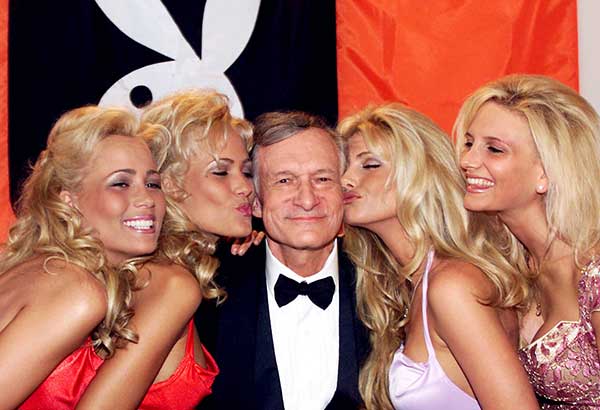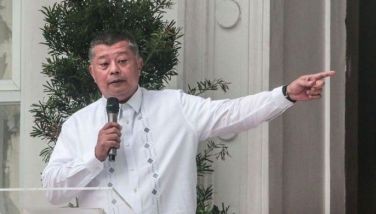Playboy founder Hugh Hefner dead at 91

In this May 14, 1999 file photo, Playboy founder and editor-in-chief Hugh Hefner receives kisses from Playboy playmates during the 52nd Cannes Film Festival in Cannes, France. The magazine has released a statement saying Hefner died of natural causes at his home in Los Angeles on Wednesday night, surrounded by family. AP
LOS ANGELES – Hugh Hefner turned silk pajamas into a work uniform, women into centerfolds and sexual desire into a worldwide multimedia empire that spanned several generations of American life.
With Playboy, he helped slip sex out of the confines of plain brown wrappers and into mainstream conversation.
In 1953, a time when states could legally ban contraceptives and the word “pregnant” was not allowed on “I Love Lucy,” Hefner published the first issue of Playboy, featuring naked photos of Marilyn Monroe and an editorial promise of “humor, sophistication and spice.”
The Great Depression and World War II were over and Playboy soon became forbidden fruit for teens and a bible for men with time and money, primed for the magazine’s prescribed evenings of dimmed lights, hard drinks, soft jazz, deep thoughts and deeper desires. Within a year, circulation neared 200,000. Within five years, it had topped 1 million.
Hefner, the pipe-smoking embodiment of the lifestyle he touted, died at his home of natural causes on Wednesday night, Playboy said in a statement. He was 91.
Hefner and Playboy were brand names worldwide. Asked by The New York Times in 1992 of what he was proudest, Hefner responded: “That I changed attitudes toward sex. That nice people can live together now. That I decontaminated the notion of premarital sex. That gives me great satisfaction.”
By the 1970s, Playboy magazine had more than 7 million readers and had inspired such raunchier imitations as Penthouse and Hustler. Competition and the internet reduced circulation to less than 3 million by the 21st century, and the number of issues published annually was cut from 12 to 11. In 2015, Playboy ceased publishing images of naked women, citing the proliferation of nudity on the internet but restored its traditional nudity earlier this year.
Hefner became the flamboyant symbol of the lifestyle he espoused. For decades he was the pipe-smoking, silk-pajama-wearing center of a constant party with celebrities and Playboy models. By his own account, Hefner had sex with more than a thousand women, including many pictured in his magazine. One of rock ‘n’ roll’s most decadent tours, the Rolling Stones shows of 1972, featured a stop at the Hefner mansion.
Throughout the 1960s, Hefner left Chicago only a few times. In the early 1970s, he bought the second mansion in Los Angeles, flying between his homes on a private DC-9 dubbed “The Big Bunny,” which boasted a giant Playboy bunny emblazoned on the tail.
Hefner was host of a television show, “Playboy After Dark,” and in 1960 opened a string of clubs around the world where waitresses wore revealing costumes with bunny ears and fluffy white bunny tails. In the 21st century, he was back on television in a cable reality show – ”The Girls Next Door” – with three live-in girlfriends in the Los Angeles Playboy mansion. Network television briefly embraced Hefner’s empire in 2011 with the NBC drama “The Playboy Club,” which failed to lure viewers and was canceled after three episodes.
Censorship of the magazine was inevitable. Playboy has been banned in China, India, Saudi Arabia and Ireland. In the 1950s, Hefner successfully sued to prevent the US Postal Service from denying him second-class mailing status. 7-Eleven stores for years did not sell the magazine. Stores that did offer Playboy made sure to stock it on a higher shelf.
He was a widely admired but far from universally beloved figure. Many feminist and religious leaders regarded him as nothing but a glorified pornographer who degraded and objectified women with impunity.
Women were warned from the first issue: “If you’re somebody’s sister, wife or mother-in-law,” the magazine declared, “and picked us up by mistake, please pass us along to the man in your life and get back to Ladies Home Companion.”
Playboy proved a scourge, and a temptation. Drew Barrymore, Farrah Fawcett and Linda Evans are among those who have posed for the magazine. Several bunnies became celebrities, too, including singer Deborah Harry and model Lauren Hutton, both of whom had fond memories of their time with Playboy. Other bunnies had traumatic experiences, with several alleging they had been raped by Hefner’s close friend Bill Cosby, who faced dozens of such allegations in recent years. Hefner issued a statement in late 2014 he “would never tolerate this behavior.” But two years later, former bunny Chloe Goins sued Cosby and Hefner for sexual battery, gender violence and other charges over an alleged 2008 rape.
Playboy also specialized in long and candid interviews, from Fidel Castro and Frank Sinatra to Marlon Brando and then-presidential candidate Jimmy Carter, who confided that he had “committed adultery” in his heart. John Lennon spoke to Playboy in 1980, not long before he was murdered.
- Latest
- Trending





























